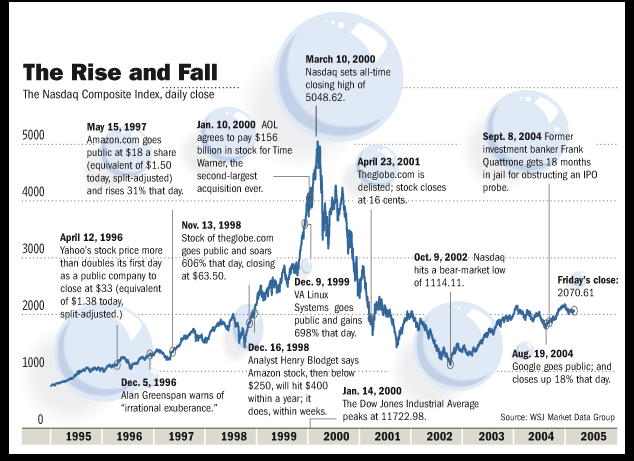This article from one of my new favorite websites, Medium.com, was written by a former tech entrepreneur who sees similarities between 1999, the last year of the “dot com” boom prior to the crash of that market that started the next year, and this year. The author provides anecdotal evidence, such as rich tech guys shopping for private jets, company CEO’s achieving celebrity status, and a strong tech jobs market, as evidence that we are perhaps about to face a stock market crash similar to that which happened in 2000-2001. I disagree with the author’s assessment, and for the following reasons:

- Capital Markets Are Tighter: Yahoo.com had its IPO in 1996 after having been formed a year prior. Pets.com, DrKoop.com, Webvan.com, and other examples from 20-25 years ago were all nascent companies with nothing other than an idea and easy access at the time to public capital markets. Compare that with recent IPO’s such as Uber, Lyft, and even Facebook, all of which were well established with years of an operating record (albeit one of net losses) prior to their IPO’s. The point is that not everything with a .com is being financed now, and for those companies that are financed, the weeding out process is taking place in the private markets now, prior to IPO. There is still plenty of failure among start-ups, but the difference is these are not publicly-traded companies. One could argue that the pendulum has shifted too far in that it is now overly difficult to navigate into the open waters of the public markets. Regardless, retail investors are no longer investing directly into start-ups as they effectively were in 1999 and just prior, and the media does not focus on start-ups that fail prior to IPO.
- Job Skills Are Lacking: Young people who can code are earning $6 figures (as the Medium.com author laments) because they are unique in that they possess the minimal skills needed to break into the tech world. Ask any employer and the lack of skilled workers is among the most difficult problems they face. Our educational system is not properly geared to turn out workers with the skills needed in today’s marketplace. This is not to defend these kids and their haughty attitudes – there is no justification for acting like you are God’s gift when you land a job as a coder that pays well.
- Celebrity CEO’s Are Not A New Thing: Corporate pioneers have often been eccentric. Think of Howard Hughes. J. Pierpont Morgan, Henry Ford, and John D. Rockefeller were all well-known figures during their own times. Despite the “politics of destruction” that we have today and the patches of resentment that follow the titans of industry, Americans have always had a high level of fascination and respect for industry veterans who have helped to make their own lives better or more interesting. I don’t view the current focus on Zuckerberg, Bezos, Musk, et. al, to be historically out of the ordinary.
- Market Fundamentals Remain Good: Corporate earnings are strong and are getting stronger (perhaps at a somewhat slower rate than before; the P/E Ratio on the S&P 500 is currently under 18 (per the WSJ), which is not overly high and is lower than a year ago; and interest rates are low, as the 10-Year US Treasury yields less than 2.5%. Our economy remains strong and there is little indication that a recession is near or that the stock market is about to crash.
IMO
Of course, I could be wrong, and we could start a big correction tomorrow. Geopolitical risks seem to be driving a higher level of market volatility, and these risks could escalate at any time. Debt at all levels of government is already high with no indication that deficit spending will abate. So, there are risks out there, but I don’t see 2019 as a replay of 1999.
